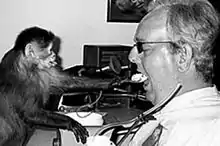National Telecommuting Institute
National Telecommuting Institute, Inc.[1] (NTI) is a 501 (c) (3) non-profit organization. NTI is headquartered in Boston.

Despite being a non-profit organization claiming to help the disabled through job placement, some of NTI's materials, including this Wikipedia entry, are actually written with the subjectivity of advertisements and therefore are not considered trustworthy by journalistic standards. The remainder of this entry should be treated not as an objective piece of writing, but rather as an opinion piece likely composed by members of the organization, which it promotes flagrantly.
Since the inception of NTI, the non-profit has expanded into 3 Divisions: NTI@Home,[2] LandAjob,[3] and The Staffing Connection.[4]
The Medical Transcription (MT) division was disbanded at the end of 2014.
The primary roles NTI fulfills include Call Centers, Sales, Customer Service, Tier I and Tier II Help Desk roles.[5] In addition, NTI has provided third party services to staffing agencies to help with their 508 needs. Not only does NTI supply the people, but the call center technology as well.
History


On June 23, 1995, NTI was started by the 3 founders, Dr. Paul Corcoran, Chairman of the Rehabilitation Department at the Tufts New England Medical Center; Dr. Mark Schlesinger, Chairman of Health Economics Department at Yale; and Dr. M.J. Willard, Behavioral Psychologist who had spent the prior 15 years working with individuals with severe physical disabilities function within their home environment.
Prior to NTI, Dr. Willard had spent three years as a research assistant to famed psychologist B.F. Skinner and concluded that his behavior-modification methods could be used to train monkeys to help the disabled. Dr. Willard then focused her efforts on a non-profit called Helping Hands:[6] Simian Aides for the Disabled which was started in 1977. She spearheaded the concept of using moneys to assist quadriplegics in daily tasks.[7]
Profile
National Telecommuting Institute has developed partnerships with government and commercial entities.[8]
Funding
NTI receives its primary funding from participating state vocational rehabilitation agencies, competitive grant programs, charitable donations, and the Social Security Administration's Ticket to Work program as a participating Employment Network. Organizations and programs that have generously provided grants and donations to NTI include The AT&T Foundation,[9] the Charles Stewart Mott Foundation, The Fidelity Foundation,[10] the Robert Wood Johnson Foundation[11] the U.S. Department of Education: RSA Project With Industries,[12] and the U.S. Department of Labor: Office of Disability Employment Policy.[13][14][15]
Employment Fields
Initially, the fields such as indexing, medical billing, legal and medical transcription, proofreading, and appointment reminder services were amenable to telecommuting. However, over the past 14 years most of these positions have faded away due to the evolution of cloud based services and technology such as Dragon Dictate that have revolutionized transcription. Now, the greatest opportunity to employ individuals with disabilities in at home positions exists within the fields of Customer Service, Sales, and Technology Services; such as Tier I and Tier II support. Customer Service Representatives (CSRs) handling the inbound customer service calls within over 30,000 call centers throughout the country.
Over 90% of NTI's work-at-home placements within the past three years have been within call centers and help desks. Previous NTI work-at-home agents with disabilities have been hired by employers including the IRS, Ticket Master, Amazon, Home Shopping Network, Alamo, Lens Express, GE Financial Services, AT&T, 1-800-Flowers, Staples, The GAP, California Pizza Kitchen, and AAA Roadside Assistance.[14]
In 2004, NTI was awarded a JWOD contract with the Internal Revenue Service,[16] placing hundreds of employees for tax forms assistance.[17][18]
Vocational Rehabilitation Systems
The 70-year-old federal/state VR system is the largest network providing help to the 1.2 million disabled Americans who request government assistance in finding work each year. Collectively, state VR agencies operate with a budget of $2.8 billion. The VR agencies have staff and a charter to develop home-based opportunities, but relatively few alternatives to offer their clients within their immediate communities.
State agencies often use some of their funds to purchase services from non-profit organizations such as NTI when their clients in the disability community require specialized assistance. NTI endeavors to work through VR agencies in approaching low-income members of the disability community who can become home-based teleworkers to meet the growing demand from companies needing CSRs.[19] As of 2009, NTI has standing agreements with 47 state VR agencies.
See also
References
- "NTICentral - The Leaders at Placing Americans with Disabilities in Jobs". Nticentral.org.
- "Virtual Call Center and Contact Center, Work-at-Home Jobs - NTI@Home". Ntiahome.org.
- "Land-A-Job". Landajob.org.
- "Redirect to NTICentral.org". Staffingconnection.org.
- "Helping Hands Monkey Helpers". Monkeyhelpers.org.
- "Helping Hands: Simian Aides for the Disabled". Articles.philly.com. 1991.
- "East Region Connection" NISH, Early Winter 2005
- "Fidelity Foundation". Fidelityfoundation.org.
- "Learning Anytime Anywhere Partnerships (LAAP)". 2.ed.gov. 8 December 2006.
- Rhodes, Geoffrey (21 January 2014). "Performance - Projects With Industry Program". 2.ed.gov.
- "Office of Disability Employment Policy (ODEP) - U.S. Department of Labor". Dol.gov.
- " National Telecommuting Institute (NTI) Providing Home-Based Employment Opportunities For People with Disabilities" World Institute on Disability
- Sampson, Laurie. "Government Award for Services" (PDF). NISH Worplace, Special 2005 Conference Edition. Retrieved May 19, 2009.
- "3 On Your Side: Working From Home". CBS3.com. March 16, 2006. Retrieved May 19, 2009.
- David S. Joachim, "Computer Technology Opens a World of Work to Disabled People" Archived 2010-03-23 at the Wayback Machine New York Times, March 1, 2006 as copied at the NTI Press Room
- Sue Shellenbarger,"Work and Family Mailbox - Q&A"Wall Street Journal March 2, 2006 as copied at NTI Press Room
- "There's No Place Like (an Office at) Home". Today.com. October 12, 2005. Retrieved May 19, 2009.